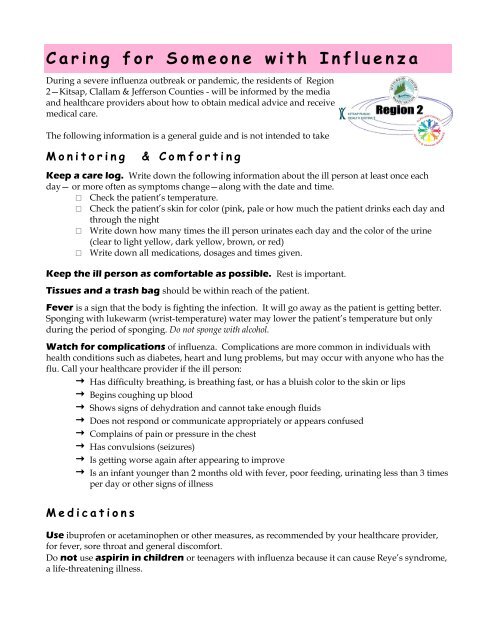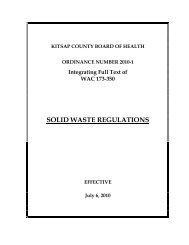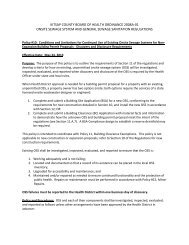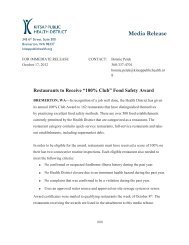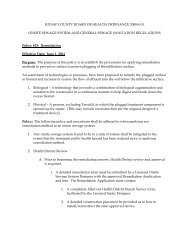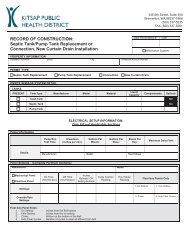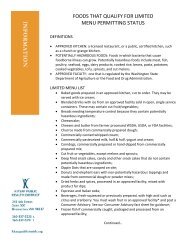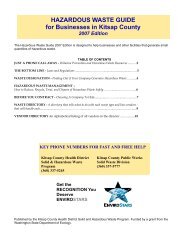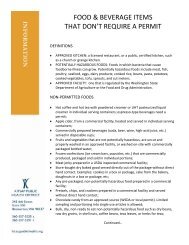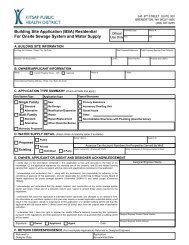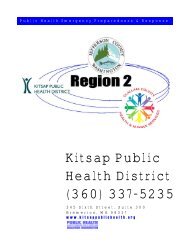Pandemic Flu - Kitsap Public Health District
Pandemic Flu - Kitsap Public Health District
Pandemic Flu - Kitsap Public Health District
You also want an ePaper? Increase the reach of your titles
YUMPU automatically turns print PDFs into web optimized ePapers that Google loves.
C a r i n g f o r S o m e o n e w i t h I n f l u e n z a<br />
During a severe influenza outbreak or pandemic, the residents of Region<br />
2—<strong>Kitsap</strong>, Clallam & Jefferson Counties - will be informed by the media<br />
and healthcare providers about how to obtain medical advice and receive<br />
medical care.<br />
The following information is a general guide and is not intended to take<br />
M o n i t o r i n g<br />
& C o m f o r t i n g<br />
Keep a care log. Write down the following information about the ill person at least once each<br />
day— or more often as symptoms change—along with the date and time.<br />
Check the patient’s temperature.<br />
Check the patient’s skin for color (pink, pale or how much the patient drinks each day and<br />
through the night<br />
Write down how many times the ill person urinates each day and the color of the urine<br />
(clear to light yellow, dark yellow, brown, or red)<br />
Write down all medications, dosages and times given.<br />
Keep the ill person as comfortable as possible. Rest is important.<br />
Tissues and a trash bag should be within reach of the patient.<br />
Fever is a sign that the body is fighting the infection. It will go away as the patient is getting better.<br />
Sponging with lukewarm (wrist-temperature) water may lower the patient’s temperature but only<br />
during the period of sponging. Do not sponge with alcohol.<br />
Watch for complications of influenza. Complications are more common in individuals with<br />
health conditions such as diabetes, heart and lung problems, but may occur with anyone who has the<br />
flu. Call your healthcare provider if the ill person:<br />
Has difficulty breathing, is breathing fast, or has a bluish color to the skin or lips<br />
Begins coughing up blood<br />
Shows signs of dehydration and cannot take enough fluids<br />
Does not respond or communicate appropriately or appears confused<br />
Complains of pain or pressure in the chest<br />
Has convulsions (seizures)<br />
Is getting worse again after appearing to improve<br />
Is an infant younger than 2 months old with fever, poor feeding, urinating less than 3 times<br />
per day or other signs of illness<br />
M e d i c a t i o n s<br />
Use ibuprofen or acetaminophen or other measures, as recommended by your healthcare provider,<br />
for fever, sore throat and general discomfort.<br />
Do not use aspirin in children or teenagers with influenza because it can cause Reye’s syndrome,<br />
a life-threatening illness.


